June 21, 2025 | 01:23 GMT +7
June 21, 2025 | 01:23 GMT +7
Hotline: 0913.378.918
June 21, 2025 | 01:23 GMT +7
Hotline: 0913.378.918
In recent years, agricultural exports have steadily increased, establishing Vietnam as the agricultural powerhouse of the world. Agroforestry-fishery (AFF) exports increased by 62.3 percent, from USD 30 billion in 2015 to USD 48.7 billion in 2021. Vietnam is among the top 15 agricultural exporting countries in the world, with products sold in 196 countries and territories and numerous items with export values over USD 1 billion.
The value and quality of agricultural products have been boosted. The percentage of high-quality rice climbed, as did the price of export rice, and by the end of the year 2020, Vietnam would have exceeded Thailand. Numerous fruits and vegetables have entered hard markets such as the United States, the European Union, Australia, Japan, and Korea.
By the end of 2021, there were 516 valid accumulating projects in the agriculture sector with a total registered investment capital of about USD 3.72 billion, representing approximately 1.5 percent of the total number of projects and 0.91 percent of total FDI into Vietnam.
By 2020, FDI businesses' AFF export turnover reached USD 8.6 billion, representing 20.8% of Vietnam's overall AFF exports.
Vietnam is a leader in the implementation of the New Vision for Agriculture initiative of the World Economic Forum, supporting public-private partnership (PPP) investment for the development of sustainable agriculture.
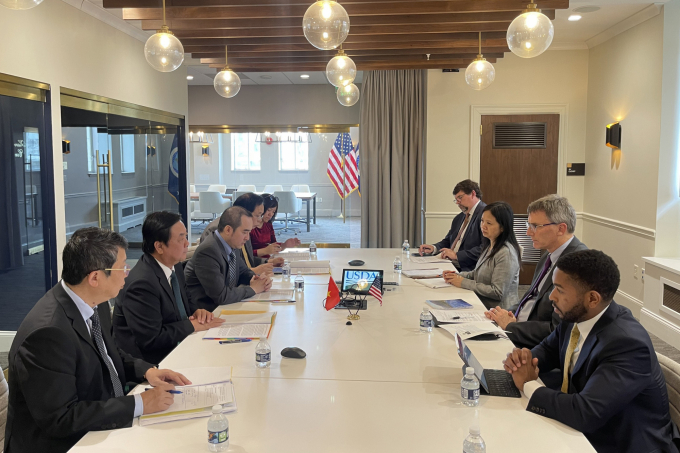
Minister Le Minh Hoan worked with Deputy Under Secretary of the US Department of Agriculture Jason Hafemeiser. Photo: Le Trung Quan.
The agricultural industry's ability to obtain and use ODA funding sources and concessional loans from sponsors is another noteworthy achievement. ODA has prioritized infrastructure development, university, and institute capacity-building, production promotion, hunger eradication, poverty reduction, livelihood improvement, climate change response, natural disaster prevention and control, epidemic prevention, hygiene, food safety, clean water, and rural environmental sanitation, among other investment projects.
The establishment and completion of policies and capacity strengthening for the central and localities have been fostered by several typical projects such as Irrigated Agriculture Improvement Project (World Bank); Sustainable Agriculture Transformation Project (World Bank); Farmer adoptability for livelihood transformations in Mekong Delta (World Bank); Clean water project in Northern, Central, and Central Highlands (ADB); North Nghe An Irrigation System Upgrading Project (JICA) among others.
The agriculture industry has actively participated in the negotiation and signing of numerous bilateral and multilateral free trade agreements, actively proposed and participated in Global Initiatives, and actively organized international forums to garner the support of international allies for sustainable agricultural and rural development.
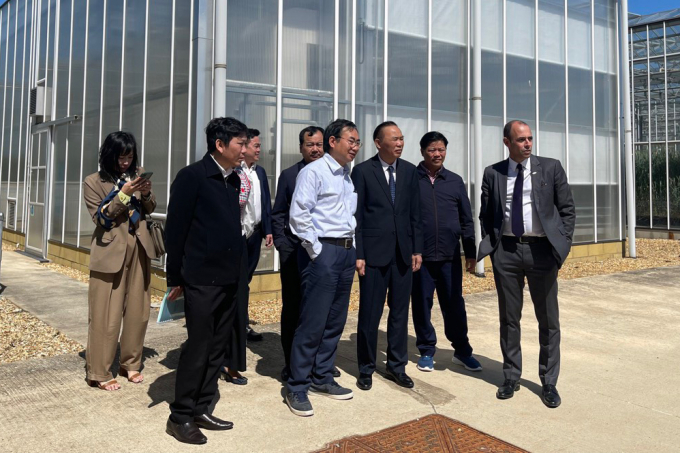
The delegation of the Ministry of Agriculture and Rural Development visited and worked with the NIAB Agricultural Innovation Center, United Kingdom. Photo: Nguyen Thanh.
Even at the height of the Covid-19 pandemic, MARD leaders joined State high-ranking delegates to visit and work with the agriculture industry's most important markets. Market opening, trade integration, and AFF investments were always the focal points of leaders' business trips.
During the working trip of Deputy Minister Le Quoc Doanh to the United States last December, Vietnam shared information with its US partners, contributing to the conclusion of the investigation into Vietnam's timber exports under Section 301 and promoting the opening of the US market to Vietnamese pomelo.
During the trip of MARD Minister Le Minh Hoan, who accompanied the Prime Minister to the United States, we built trust in the partnership with the United States, promoting deeper trade and investment connections between Vietnam and the United States in agriculture.
The Minister and MARD leaders assisted Vietnamese agriculture enterprises in connecting with global consumption channels such as Walmart (US), Rungis (France), Aeon Group (Japan), and CJ Group (South Korea) via working trips.
We have attended key international forums such as UN Food Systems Summit, The UN Climate Change Conference (COP26) among others.
The working trips resulted in the signing of a number of agreements, which mobilized the cooperation and support of bilateral partners such as the United States, France, the United Kingdom, Japan, and South Korea, among others, and multilateral partners such as the World Bank, FAO, and WWF, among others, for the market opening and sustainable development of Vietnam's agriculture.
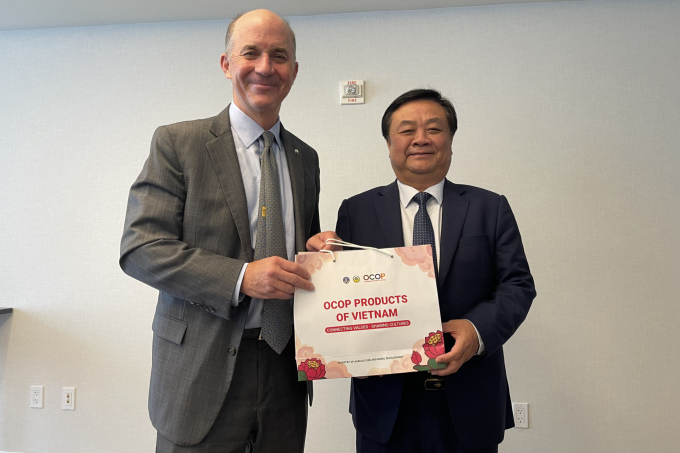
OCOP agricultural products are presented as a gift by Minister Le Minh Hoan during his working trips. Photo: Le Trung Quan.
Bilateral and multilateral international partners have made significant contributions to the sector via technical support, awareness-raising, capacity building, and resource mobilization.
International partners have given particular consideration and assistance to the development of green, ecological, and sustainable agriculture. This not only helps us deploy support resources but also enhances Vietnam's reputation as a friendly and trustworthy partner.
Specifically, we have actively mobilized support and coordinated with international partners to develop the Sectoral GHG Emission Mitigation Plan to 2030, which includes the Methane Reduction Plan to 2030, the Implementation of the Glasgow Declaration on "Forests and Land Uses," and the Action Plan to transform the Vietnamese food system into "transparency, responsibility, and sustainability."
Promote innovation and transfer efficient emission reduction technologies in the agricultural sector to Vietnam; enhance technical assistance for Vietnam to implement solutions to decrease greenhouse gas emissions; expand climate-smart agricultural practices, circular agriculture, etc.
And as soon as the strategic orientations and execution plans were formed, we engaged the multilateral and bilateral, public and private resources of international partners to execute these efforts. Projects on emission reduction, the development of ecological, circular, and organic agriculture, the protection of biodiversity in all aspects of agriculture, livestock production, forestry, fisheries, and irrigation among others.
Translated by Linh Linh
![Turning wind and rain into action: [10] Advancing accessible climate services for farmers](https://t.ex-cdn.com/nongnghiepmoitruong.vn/608w/files/linhnhp/2025/06/20/1911-z6704423696987_15fd32ffc26d590d204d520c9dac6786-nongnghiep-161854.jpg)
(VAN) Not only does it help farmers 'avoid droughts and rains,' the development of agricultural climate services also enhances their ability to proactively adapt to a rapidly changing climate.
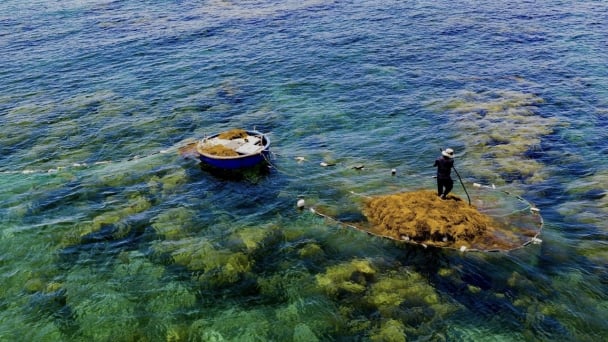
(VAN) With international assistance, the harvesting of sargassum seaweed in Quang Ngai has become increasingly regulated, thereby safeguarding marine life and ensuring the stability of coastal communities' livelihoods.
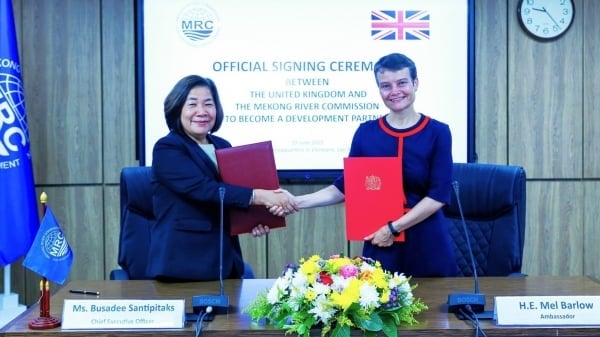
(VAN) On June 19, the United Kingdom officially became a Development Partner of the Mekong River Commission.

(VAN) Biodiversity is being threatened by traditional remedies made from wildlife. Traditional medicine and humans must change to live in harmony with nature.

(VAN) Agrifood investment and finance solutions for people and the planet.

(VAN) Microplastic contamination has become pervasive in seafood, posing unprecedented challenges for food safety and marine ecosystems.
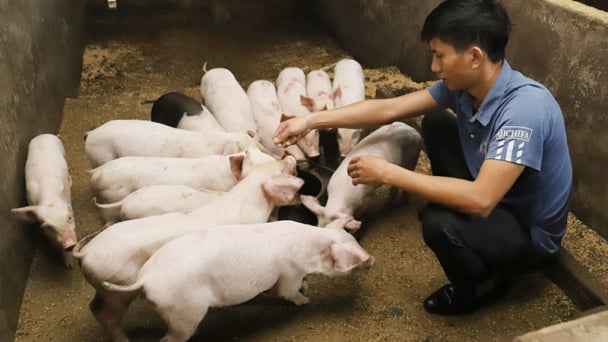
(VAN) Proactively using vaccines, combined with transport control and enhanced surveillance, is the only viable path toward biosecure and sustainable livestock production in Vietnam.